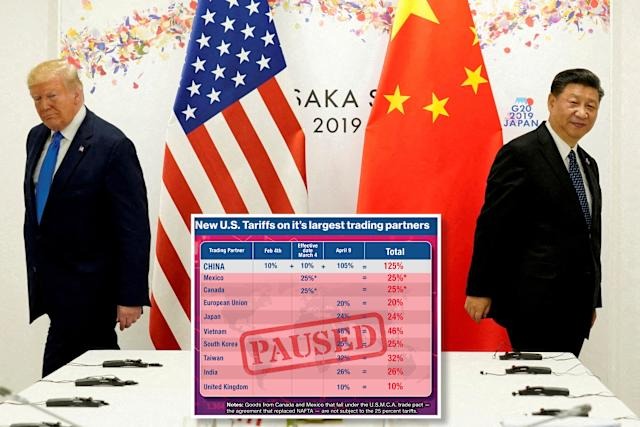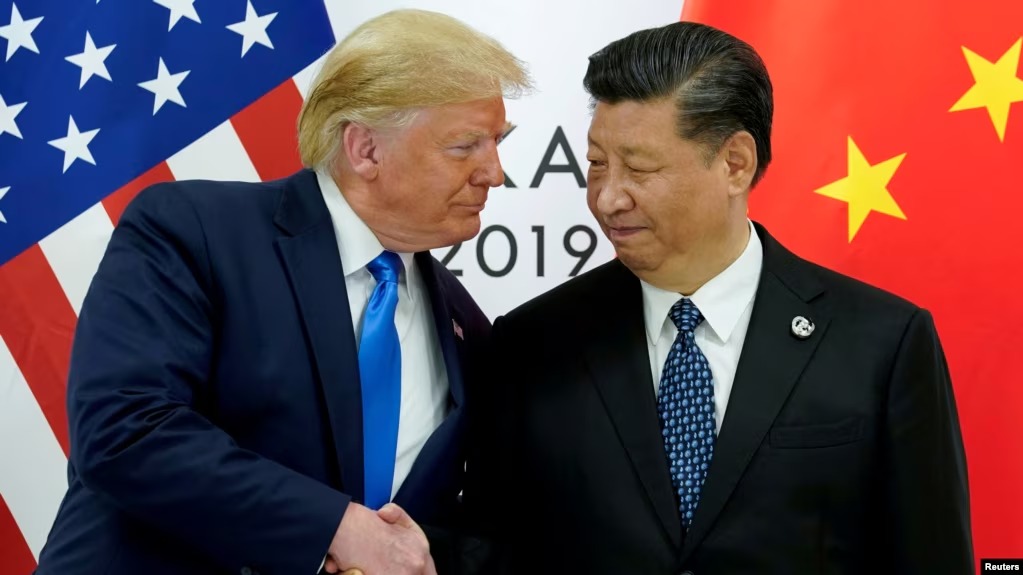Prime Minister Anthony Albanese is being urged to hold the line on offering concessions to Donald Trump in return for tariff relief to avoid a flood of similar demands from other trading partners as China fired the latest shot in the rapidly escalating global trade war late Friday.
China’s Finance Ministry said it would raise tariffs on US goods from 84 per cent to 125 per cent from Saturday after Trump confirmed the cumulative duties on Chinese goods had hit 145 per cent.
Anthony Albanese visiting Rio Tinto’s Dampier Port in WA on Friday. The prime minister said he welcomed Trump’s 10 per cent tariff rate. Alex Ellinghausen
“The US imposition of abnormally high tariffs on China seriously violates international and economic trade rules, basic economic laws and common sense and is completely unilateral bullying and coercion,” China’s Finance Ministry said in a statement.
In the latest gyration from the White House, Trump on Thursday (Friday AEST) signalled he would consider pleas to reduce the 10 per cent tariff rate, a move welcomed by Albanese.
Justin Brown, Australia’s lead negotiator for the Trans-Pacific Partnership free trade pact and a former ambassador to the European Union, said he was “firmly in the wait-it-out camp” rather than rush into talks with the US given the volatility.
“We should advocate for an exemption but not negotiate,” Brown said.
“If ‘negotiating’ means giving the US commercially meaningful concessions on quarantine and/or the Pharmaceutical Benefits Scheme, I can’t see how the pros would outweigh the cons.
“If we did a deal on quarantine, it would face major resistance from local agricultural sector interests, and not just in meat. And if we gave the US a deal, we’d open ourselves up to immediate pressure and demands from other major trading partners for the same treatment.”
China’s latest retaliation came after jostling in Australia’s backyard intensified. Chinese President Xi Jinping will make a rare sweep through South-East Asia next week to attempt to shore up relationships, after Vietnam agreed to US demands to crack down on Chinese-made goods being exported through its ports.
Trump dramatically ramped up his campaign to upend the global trading system last week, slapping a baseline 10 per cent tariff on all countries and then hitting those nations that have a trade deficit with the US with even higher “reciprocal” duties.
The announcement sent global markets seesawing, with some of the heavy losses recovering when Trump announced a 90-day delay to the reciprocal duties and all countries other than China being put on the 10 per cent rate.

But on Friday the same bond markets that forced Trump into his backdown were again rising back to the levels that so worried investors earlier in the week. The US 10-year government bond rate, which has the most important influence on the cost of borrowing money around the world, climbed back to the levels that had panicked markets on Tuesday.
The 10-year bond edged higher towards 4.5 per cent on Friday during another Asian trading session in which investors offloaded US treasury bonds and US dollar assets, a clear sign that markets were questioning the safety of the global superpower.
“I’ve never seen a market like that in 35 years,” said Tim Hext, head of government bond strategies at Pendal. “I ebb and flow between the fact that Trump does have a longer-term strategy and the fact that he doesn’t and in that environment, it’s difficult to make near-term decisions.”
The Australian bond market has also been caught in the crosshairs of the trade war. While money market traders have moved to drastically cut the odds that the Reserve Bank lower interest rates, long-term bond rates are going in a different direction.
The Australian 10-year bond on Monday fell to its lowest level this year of 4.05 per cent but has steadily climbed to 4.36 per cent since, a dramatic move in a market that usually moves in a much tighter range.
Ahead of a cabinet meeting, Trump told journalists he could reduce the 10 per cent baseline tariff in talks with other leaders but “it depends on what they’re adding”.
“Some countries we have massive deficits with, or they have big surpluses with us, and others it’s not that way, so it depends,” Trump said.
“We have some that are pretty even, but they hurt us in other ways. So we just want to get that taken care of. Everyone is a little bit different.”
Although the US enjoys a trade surplus with Australia, the past two months have seen a deficit because of a surge in gold purchases as American investors seek safe havens. But US trade officials have long attacked Australia’s agricultural biosecurity requirements and the Pharmaceutical Benefits Scheme, which puts price controls on medicines, as trade barriers.
The ban on US beef has become particularly totemic, with Trump singling it out.
Albanese said he welcomed Trump’s latest comments about the 10 per cent tariff rate.
“We believe that reciprocal tariffs on Australia should be zero. Let’s be very clear,” Albanese said from Darwin where he was campaigning.
Both Albanese and Opposition Leader Peter Dutton refused to weigh into concerns over the fate of the AUKUS nuclear submarine pact after Trump ordered billionaire Elon Musk, who has swung the axe through US departments, to turn his focus to US naval shipbuilding programs.
“I’m confident about AUKUS because I’ve had those firsthand discussions with the president of the United States and also with more than 100 members of Congress,” Albanese said.
Albanese has not been among the world leaders who have spoken to Trump to demand a tariff exemption. He conceded that the caretaker period ahead of the May 3 election had affected those efforts but denied there was complete inaction with officials engaging US counterparts daily.
Brown added that “factionalism” in the Trump administration between protectionist hardliners and those in favour of lower tariffs and exemption “casts doubt on whether a serious negotiation could be had”.
“The US Trade Representative Jamieson Greet’s comments to Senator Mark Warner suggest that many in the administration see the 10 per cent tariff on us primarily in punitive terms.”
Trump tried to reassure investors by expressing hope of a deal with China rather than a full-blown trade war.

“I’m sure that we’ll be able to get along very well,” Trump said, adding that he respected Xi. “In a true sense he’s been a friend of mine for a long period of time, and I think that we’ll end up working out something that’s very good for both countries.”
Xi’s planned trip is intended to shore up ties with Vietnam, Cambodia and Malaysia, three of the region’s countries hardest hit by Trump’s “reciprocal tariffs” of 46 per cent, 49 per cent and 24 per cent respectively.
The announcement of Xi’s trip came just hours after Vietnamese Deputy Prime Minister Ho Duc Phoc agreed to crack down on Chinese-owned companies falsely labelling products as made in Vietnam during a visit to Washington.
